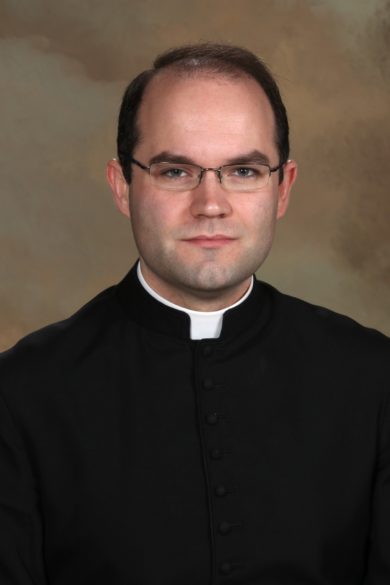SPIRIT AND TRUTH
By Father Aaron Williams
It seems that more and more we are referencing time today by “before” or “after” COVID. One of the effects of the pandemic has been a tendency for families to request to forego the normal funeral Mass and to simply have an outdoor graveside service for their deceased loved ones. Usually this is done to avoid gathering a large crowd, and because it is outside and in open air. However, I fear that sometimes families are having graveside services in order to avoid the stress or expense that usually comes with planning a full funeral. In these situations, I usually like to counsel people that it is far less likely they will regret having a funeral for their deceased loved one, than they would regret not having one.

But we as Catholics do not believe in the necessity of funeral Masses simply because it seems like “the right thing to do.” The Catholic Funeral Mass, we believe, accomplishes a spiritual work, which is absent in a funeral outside a Mass, let alone a graveside service. (Perhaps it is important to mention that there is technically not a Catholic rite for a ‘graveside service.’ There is simply the rite of burial which is always done at a graveside whether a funeral Mass precedes it or not).
The secular world has started to call funerals “celebrations of life,” but this opposes the Catholic understanding of a funeral. When a Catholic goes to a funeral, we are not there because we need to celebrate a life lived. In death “life is changed, not ended,” we say in the funeral preface. A funeral which merely makes mention of a person’s earthly life denies our belief in the resurrection, and the very real need that the dead have of our prayers.
In the Second Book of Maccabees, we hear the story of Judas Maccabeus and his soldiers gathering the bodies of the those who had fallen in battle and offering prayers and sacrifices for them. This was done because Judas realized these fallen men had committed the sin of idolatry, which needed to be atoned. Afterwards, the sacred author records, “they turned to prayer, beseeching that the sin which had been committed might be wholly blotted out … [and they] also took up a collection, man by man, to the amount of two thousand drachmas of silver, and sent it to Jerusalem to provide for a sin offering. In doing this [Judas] acted very well and honorably, taking account of the resurrection. For if he were not expecting that those who had fallen would rise again, it would have been superfluous and foolish to pray for the dead.” (2 Maccabees 12:42-44)
The fundamental purpose of the Catholic funeral is to pray for the dead, and the most efficacious prayer we can ever offer is the Holy Mass. Hence, there is no greater prayer for our dead loved ones than a funeral Mass. In doing so we fulfill both a spiritual and corporal work of mercy, by praying for and burying the dead.
All of the texts and prayers of the Catholic funeral point to this double reality: that the dead are in need of prayer and purification because of their sins; and that God is merciful and promises us the hope of resurrection unto eternal life. We come to the funeral, in the words of Father Paul Scalia (preaching at his father — Antonin Scalia’s funeral) “to lend our prayers to that perfecting, to that final work of God’s grace, in freeing [the dead] from every encumbrance of sin.”
The overall emotion of the funeral Mass is mercy, which is why even in the reformed liturgy the prescribed liturgical color for a funeral is violet or black. In the Dioceses of the U.S., white is given by indult as a third option “when pastorally appropriate.” It should be noted that in some cultures, particularly in some Asian cultures, white is the color of mourning.
The funeral Mass is not, as some call it, a “celebration of resurrection,” as we know that before being raised to the perfection of heaven, most Christians must undergo the spiritual purification that God offers to souls in purgatory. We do our deceased loved ones a great injustice by failing to pray for them.
Often, when planning funerals, we are filled with difficult emotions, and we want to forget the reality of death by distracting us with happier thoughts. But the truth is that death is a result of the fall — of the sin of our first parents, and our inherited sinfulness. The hope and joy of Christian death is that Christ can purify us with His grace and make us worthy of His presence forever. And we can lend our aid to this perfecting by our own works of prayer, fasting and almsgiving and most especially by our offering of the Holy Mass.
(Father Aaron Williams is parochial vicar at St. Patrick and St. Joseph Meridian.)
